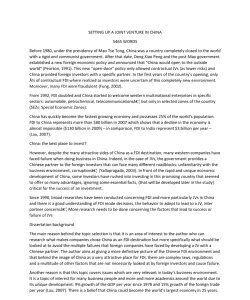SETTING UP A JOINT VENTURE IN CHINA Before 1980, under the presidency of Mao Tse Tong, China was a country completely closed to the world with a rigid and communist government. After that 5465 WORDS
SETTING UP A JOINT VENTURE IN CHINA Before 1980, under the presidency of Mao Tse Tong, China was a country completely closed to the world with a rigid and communist government. After that 5465 WORDS
SETTING UP A JOINT VENTURE IN CHINA
5465 WORDS
Before 1980, under the presidency of Mao Tse Tong, China was a country completely closed to the world with a rigid and communist government. After that date, Deng Xiao Peng and the post-Mao government established a new foreign economic policy and announced that “China would open to the outside world” (Pearson, 1991). This new “open-door” policy only allowed contractual JVs (as lower risks) and China provided foreign investors with a specific partner. In the first years of the country’s opening, only ¼ of contractual FDI where realized as investors were uncertain of this completely new environment. Moreover, many FDI were fraudulent (Fung, 2002).
From 1992, FDI doubled and China started to welcome western multinational enterprises in specific sectors: automobile, petrochemical, telecommunications… but only in selected zones of the country (SEZs: Special Economic Zones).
China has quickly become the fastest growing economy and possesses 25% of the world’s population. FDI to China represents more than $80 billion in 2007 which shows that a decline in the economy is almost impossible ($130 billion in 2009) – in comparison, FDI to India represent $3 billion per year – (Lau, 2007).
China: the best place to invest?
However, despite the many attractive sides of China as a FDI destination, many western companies have faced failure when doing business in China. Indeed, in the case of JVs, the government provides a Chinese partner to the foreign investors that can face many different roadblocks: unfamiliarity with the business environment, corruption… (Yallapragada, 2003). In front of the rapid and unique economic development of China, some investors have rushed into investing in this promising country that seemed to offer so many advantages, ignoring some essential facts, (that will be developed later in the study) critical for the success of an investment.
Since 1990, broad researches have been conducted concerning FDI and more particularly JVs in China and there is a good understanding of FDI mode decisions, the behavior to adopt to lead to a JV, inter
